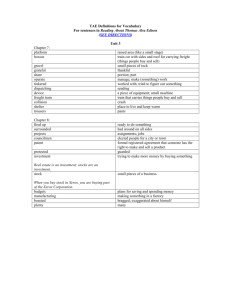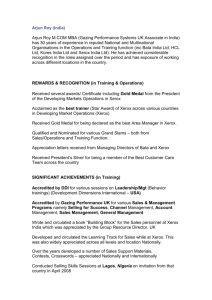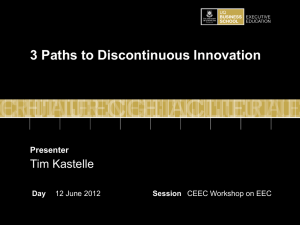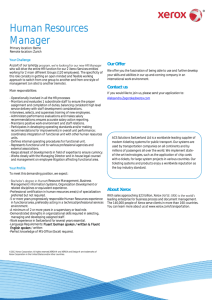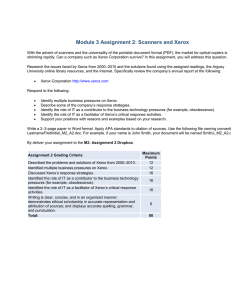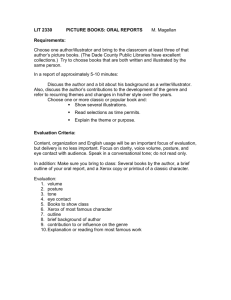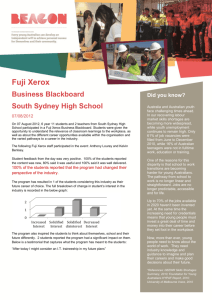Make Your Good Team Great
advertisement
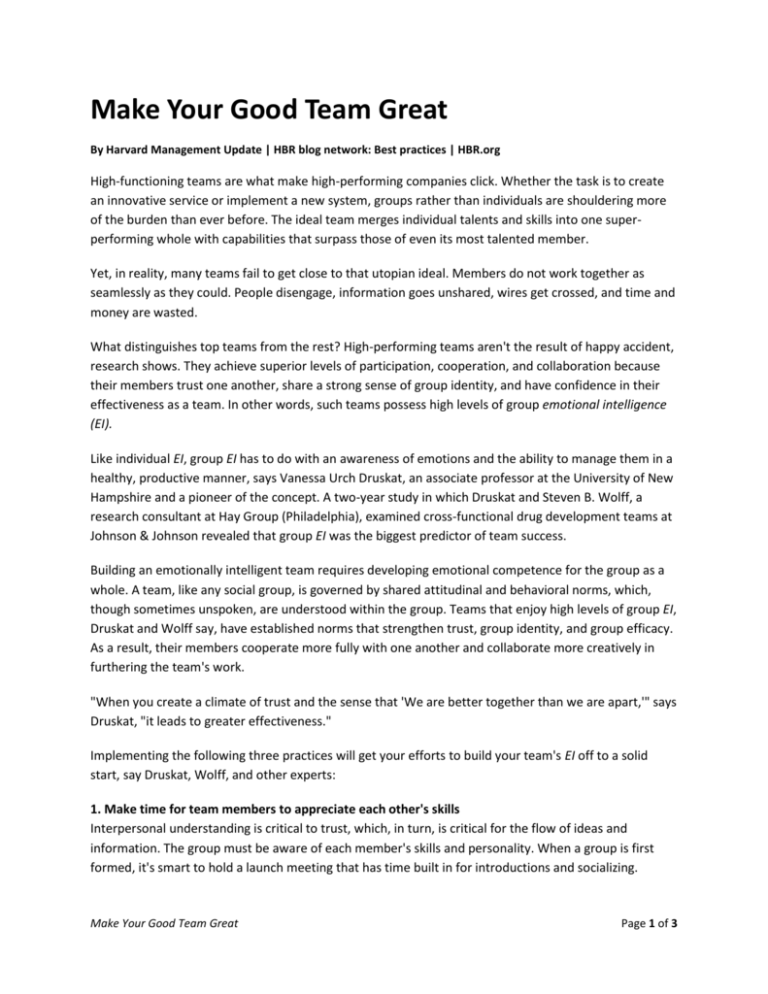
Make Your Good Team Great By Harvard Management Update | HBR blog network: Best practices | HBR.org High-functioning teams are what make high-performing companies click. Whether the task is to create an innovative service or implement a new system, groups rather than individuals are shouldering more of the burden than ever before. The ideal team merges individual talents and skills into one superperforming whole with capabilities that surpass those of even its most talented member. Yet, in reality, many teams fail to get close to that utopian ideal. Members do not work together as seamlessly as they could. People disengage, information goes unshared, wires get crossed, and time and money are wasted. What distinguishes top teams from the rest? High-performing teams aren't the result of happy accident, research shows. They achieve superior levels of participation, cooperation, and collaboration because their members trust one another, share a strong sense of group identity, and have confidence in their effectiveness as a team. In other words, such teams possess high levels of group emotional intelligence (EI). Like individual EI, group EI has to do with an awareness of emotions and the ability to manage them in a healthy, productive manner, says Vanessa Urch Druskat, an associate professor at the University of New Hampshire and a pioneer of the concept. A two-year study in which Druskat and Steven B. Wolff, a research consultant at Hay Group (Philadelphia), examined cross-functional drug development teams at Johnson & Johnson revealed that group EI was the biggest predictor of team success. Building an emotionally intelligent team requires developing emotional competence for the group as a whole. A team, like any social group, is governed by shared attitudinal and behavioral norms, which, though sometimes unspoken, are understood within the group. Teams that enjoy high levels of group EI, Druskat and Wolff say, have established norms that strengthen trust, group identity, and group efficacy. As a result, their members cooperate more fully with one another and collaborate more creatively in furthering the team's work. "When you create a climate of trust and the sense that 'We are better together than we are apart,'" says Druskat, "it leads to greater effectiveness." Implementing the following three practices will get your efforts to build your team's EI off to a solid start, say Druskat, Wolff, and other experts: 1. Make time for team members to appreciate each other's skills Interpersonal understanding is critical to trust, which, in turn, is critical for the flow of ideas and information. The group must be aware of each member's skills and personality. When a group is first formed, it's smart to hold a launch meeting that has time built in for introductions and socializing. Make Your Good Team Great Page 1 of 3 Members can get acquainted with one another as they start hammering out team goals and creating a shared vision of success. Once a team is established, taking five minutes at the beginning of regular meetings for members to share work progress and personal reflections helps fortify the group's understanding of each individual and how together they all contribute to a common goal. "People on teams where people knew one another better were more efficient and got more work done," Druskat says. Some teams, such as the accounting team at Xerox Canada in North York, Ontario, tasked with achieving year one adherence to Sarbanes-Oxley Act accounting and disclosure rules with new leadership and only six months remaining to obtain compliance, use more formal mechanisms. To showcase their skills and experiences, members took turns at a weekly meeting sharing a past success or crucial lesson. One member, whom others had discounted because she lacked a finance background, described how in a previous role she had managed the push and pull of providing customers with specific services by persuading internal people--people over whom she had no formal authority--to do the work required to deliver those services. Her presentation opened her teammates' eyes to the value she could provide, says Denise Holmes, manager of internal control at Xerox Canada. Achieving compliance meant a lot of additional work on business owners' behalf and thus her experience, closely related to this task, increased other members' trust in her and enhanced the group's emerging sense of itself as a talented, capable collective that would be able to meet the formidable challenges that lay ahead. 2. Surface and manage emotional issues that can help or hinder the team's progress It's important to establish comfortable, group-sanctioned ways to express the inevitable anger, tension, and frustration that arise in a team endeavor and to positively redirect that energy. "Inevitably, a team member will indulge in behavior that crosses the line, and the team must feel comfortable calling the foul," Druskat and Wolff write in their Harvard Business Review article, "Building the Emotional Intelligence of Groups" (Reprint # R0103E). Both humor and playfulness can be helpful tools in defusing conflict and relieving tension. One team at the worldwide innovation consultancy Ideo (Palo Alto, Calif.), says Druskat, tossed soft toys over cubicle walls when feelings ran high. Besides lightening the mood, this action served as a reminder that the group had established norms for expressing difficult emotions, thereby making them feel less threatening to individuals and to the group as a whole. In another approach, the Xerox team members wrote down their gripes, clipped them to play money in denominations from $1 to $100 depending on how serious they felt the issue to be, and dropped them into an "opportunities" jar. Their gripes were discussed at meetings, starting with problems attached to larger denominations. The process enhanced the group's emotional competence in several ways. First, it increased trust by fostering openness and decreasing the temptation for members to express their frustration in destructive ways. "Setting up a place where people can deposit something that bothers them allows Make Your Good Team Great Page 2 of 3 them to get it off their chest and continue with their day," says Linda Lopeke, president and CEO of Lexicorp Services in Mississauga, Ontario, who coached the Xerox team. Second, those with complaints saw them dealt with fairly and positively. In response to a complaint that an overly gregarious (and unnamed) team member was a distraction, the group developed a goodnatured solution: small placards for the backs of their chairs reading "The doctor is in" or "The doctor is out." Holmes explains that when the doctor was "in," visiting was OK; when the doctor was "out," it wasn't. Third, the jar truly did offer opportunities by enabling members to expand skills while helping forward the team's work. For example, the jar revealed that members were unable to get past the Xerox firewall when working offsite. The individual who volunteered to troubleshoot was not an IT specialist but had enough computer knowledge, curiosity, and persistence to find and eliminate the glitch. 3. Celebrate success Building the EI of a team also requires the expression of positive emotions, such as gratitude for going the extra mile or pride in a job well done. Recognizing individual and group achievements not only strengthens a team's identity, but it also spotlights its effectiveness and fuels its collective passion for excellence. For instance, Xerox Canada created a "Wall of Fame" to honor members of the SarbanesOxley team. "Celebrating positive emotions is very easy to do," says Druskat. Giving each other high fives, toasting one another at dinners, or simply clapping for someone in a meeting-- it's amazing, she says, what such simple acts "can do for building a sense of solidarity, efficacy, and identity." An added bonus Xerox Canada's Sarbanes-Oxley team achieved its objective of 2004 compliance, attracting positive attention from the entire organization in the process. Its celebration of its members' accomplishments, its recognition of other teams' contributions, and--above all--its success at meeting a very challenging goal gained it such widespread attention within the company that it is now inundated with applications when a job is posted. This is not surprising, says Druskat. "People want to belong to something that they think is effective." Judith A. Ross is a freelance business writer based in Concord, Mass. Make Your Good Team Great Page 3 of 3
